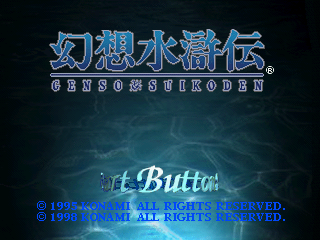Difference between revisions of "Gensou Suikoden"
From Sega Retro
m (Text replacement - "==Technical information== ===" to "==Technical information== {{mainArticle|{{PAGENAME}}/Technical information}} ===") |
|||
| Line 79: | Line 79: | ||
==Technical information== | ==Technical information== | ||
| + | {{mainArticle|{{PAGENAME}}/Technical information}} | ||
===ROM dump status=== | ===ROM dump status=== | ||
{{romtable| | {{romtable| | ||
Revision as of 20:07, 19 April 2023
| Gensou Suikoden | ||||||||||
|---|---|---|---|---|---|---|---|---|---|---|
| System(s): Sega Saturn | ||||||||||
| Publisher: Konami | ||||||||||
| Developer: Konami Computer Entertainment Sapporo | ||||||||||
| Original system(s): PlayStation | ||||||||||
| Sound driver: SCSP/CD-DA (3 tracks) | ||||||||||
| Genre: RPG[1][2] | ||||||||||
| Number of players: 1 | ||||||||||
| ||||||||||
|
This short article is in need of work. You can help Sega Retro by adding to it.
Gensou Suikoden (幻想水滸伝), called just Suikoden outside Japan, is a 1995 RPG by Konami for the PlayStation. Konami brought the game to the Sega Saturn in 1998. The Saturn version was only released in Japan.
Contents
Plot
Note: Names are from the PS1 version, which was released outside of Japan.
The Hero (nameable by the player) is the son of a Great General of the Scarlet Moon Empire, Teo McDohl. Teo is called away to fight a battle in the northlands, leaving his son alone under the guardianship of several family friends to begin his career in the Imperial Army. The Hero soon comes to realise through his missions and association with his leaders that the corruption within the Empire's top tier has led to a country whose populace is enslaved and unhappy.
Through his friend Ted, he comes into possession of the Rune of Life and Death (also known as the Soul Eater), one of 27 True Runes that govern various aspects of the world. The Rune, ruthlessly hunted for by corrupt officials within the Empire and their manipulators, force the Hero and his companions to flee the capital city of Gregminster.
This early chain of events forces the Hero to cross paths with a rebel organization where he is sheltered, although he is only convinced of the need to struggle against the Empire when the hideout is attacked and sacked by Imperial forces. Recruiting the help of Mathiu Silverberg, a former Imperial strategist, the Hero's Liberation Army starts off as a small force working to unite rebel factions throughout Scarlet Moon, and eventually becomes a force large enough and powerful enough to bring down the Empire itself.
Production credits
- Producer: Kouji Hiroshita, Kengo Nakamura
- Story: Yoshitaka Murayama (KCET)
- Character Design: Junko Kawano (KCET)
- Programmer: Akira Nakayama, Hideki Nobutaka, Katsuhiko Kii, Kasa-P, Kazufumi Shimizu
- Designer: Yohsuke Toyoshima, Yukiko Yamaki, Kazunori Yamamoto, Hiroshi Onoguchi, Shinya Nakayama
- Sound Designer: No Name
- Sound Effect: No Name
- Sound Programmer: Nanashi
- Director&Editor: Hiroshi Onoguchi
- Character Graphics: Junko Kawano (KCET)
- Programmer: Yusuke Takumi
- Assistant Director: Yohsuke Toyoshima
- Image&Graphics: Yohsuke Toyoshima, Yukiko Yamaki, Kazunori Yamamoto, Alex.R, Yoshihiro Iwata
- Package Design: Osamu Shigeta
- Publicity: Akiko Ezawa
- Director: Yoshitaka Maruyama
- Programmer: Katsuaki Miyauchi, Yasuo Tsurugai, Kazunari Sarugaku
- Designer: Junko Kawano, Jun Saito, Koō.N, Toshiyuki Tanaka
- Music Compose: Miki Higashino, Hirofumi Tanugucci, Koshi Tamawari
- Mix Engineer: Maimai
- Ending Theme: Avetuneiro Antes Lance Mao
- Chorus: Kazuhito Ogikubo, Michiru Yamane, Takashi Tateishi, Never, Rusamariho, I Am Junchan, Sayurin, Kazumi Oikawa, Miyata♥M・I・Y・U・K・I, Paco Soeda, Junkey Tsuru, MR., Maj A, Nayuta Tokashiki, Hiroe Noguchi, M.Mashan, Monkey Funkey, Punk Takabō, Pancho Satou
- Special Thanks to: Masaki Yoneoka (KCET), Kenichiro Imaizumi (KCET), Yukihiro Kobayashi, Mutsumi Shinohara, Yoshihiro Iwata, Hideyuki Takahashi, Masaru Ohwaku
- Directed by: Akira Nakayama
- Developed by: Konami Computer Entertainment Sapporo
Magazine articles
- Main article: Gensou Suikoden/Magazine articles.
Physical scans
| Sega Retro Average | |||||||||||||||||||||||||||||
|---|---|---|---|---|---|---|---|---|---|---|---|---|---|---|---|---|---|---|---|---|---|---|---|---|---|---|---|---|---|
|
| 68 | |
|---|---|
| Based on 5 reviews | |
Technical information
- Main article: Gensou Suikoden/Technical information.
ROM dump status
| System | Hash | Size | Build Date | Source | Comments | |||||||||
|---|---|---|---|---|---|---|---|---|---|---|---|---|---|---|
| ✔ |
|
440,122,704 | 1998-07-01 | CD-ROM (JP) | T-9525G V1.006 |
Track list
| 1. Data track |
|---|
| 2. Mamonotati tono Taiketu (5:05) |
|---|
| EN: Confrontation with Monsters |
| From: Battle BGM |
| 3. Saikyou no Teki (7:32) |
|---|
| EN: The Strongest Enemy |
| From: Boss Battle BGM |
| 4. Track04 (2:37) |
|---|
References
- ↑ File:GensouSuikoden Saturn JP Box Back.jpg
- ↑ 2.0 2.1 https://sega.jp/history/hard/segasaturn/software_l.html#tab04 (Wayback Machine: 2019-12-07 02:59)
- ↑ Famitsu, "1998-09-25" (JP; 1998-09-11), page 1
- ↑ Saturn Fan, "1998 No. 18" (JP; 1998-09-11), page 138
- ↑ Saturn Fan, "1998 No. 21" (JP; 1998-11-06), page 106
- ↑ Sega Saturn Magazine, "1998-26 (1998-09-25)" (JP; 1998-09-11), page 193
- ↑ Sega Saturn Magazine, "Readers rating final data" (JP; 2000-03), page 14
| Gensou Suikoden | |
|---|---|
|
Main page | Comparisons | Magazine articles | Reception | Technical information | |




